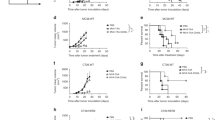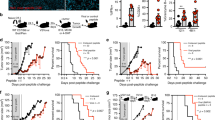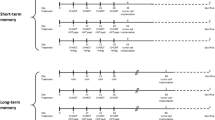Summary
The role of vaccinia virus-reactive helper T cells (Th) in augmenting in vivo generation of antitumor protective immunity and the Ly phenotype mediating the enhanced in vivo tumor immunity were investigated. C3H/HeN mice were inoculated i.p. with viable vaccinia virus to generate vaccinia virus-reactive Th activity. The mice were subsequently immunized i.p. with virus-infected syngeneic X5563 and MH134 tumor cells, and spleen cells from these mice were tested for in vivo tumor neutralizing activity. Immunization of virus-primed mice with virus-uninfected tumor cells and of virus-unprimed mice with virus-infected tumor cells failed to result in in vivo protective immunity. In contrast, spleen cells from mice immunized with virus-infected tumor cells subsequent to virus-priming exhibited potent tumor-specific neutralizing activities. Such an augmented generation of in vivo protective immunity was accompanied by enhanced induction of tumor-specific cytotoxic T lymphocyte (CTL) and antibody activities in X5563 and MH134 tumor systems, respectively. However, analysis of the effector cell type responsible for in vivo tumor neutralization revealed that enhanced in vivo immunity was mediated by Lyt-1+2− T cells in both tumor systems. Moreover, the Lyt-1+2− T cells exerted their function in vivo under conditions in which anti-X5563 tumor-specific CTL or anti-MH134 tumor-specific antibody activity was not detected in recipient mice. These results indicate that augmenting the generation of a tumor-specific Lyt-1+2− T cell population is essential for enhanced tumor-specific immunity in vivo.
Similar content being viewed by others
References
Bhan AK, Perry L, Cantor H, McClusky RT, Benacerraf B, Green MI (1981) The role of T cell set in the rejection of a methylcholanthrene-induced sarcoma (s1509a) in syngeneic mice. Am J Pathol 102:20
Bromberg JS, Lake P, Brunswick M (1982) Viral antigens act as hapten determinants for antibody responses to cell surface antigens. J Immunol 129:683
Callahan GN (1984) Soluble factors produced during an immune response regulate Ia antigen expression by murine adenocarcinoma and fibrosarcoma cells. J Immunol 132:2649
Dialynas DP, Wilde DB, Marrack P, Pierres A, Wall KA, Havran W, Otten G, Loken MR, Pierres M, Kappler J, Fitch FW (1983) Characterization of the murine antigenic determinant, designated L3T4a, recognized by monoclonal antibody GK1.5: expression of L3T4a by functional T cell clones appears to correlate primarily with class II MHC antigenreactivity. Immunol Rev 74:29
Fujiwara H, Hamaoka T, Shearer GM, Yamamoto H, Terry WD (1980) The augmentation of in vitro and in vivo tumor-specific T cell-mediated immunity by amplifier T lymphocytes. J Immunol 124:863
Fujiwara H, Shimizu Y, Takai Y, Wakamiya N, Ueda S, Kato S, Hamaoka T (1984) The augmentation of tumor-specific immunity by virus-help. I. Demonstration of vaccinia virus-reactive helper T cell activity involved in enhanced induction of cytotoxic T lymphocyte and antibody responses. Eur J Immunol 14:171
Fujiwara H, Fukuzawa M, Yoshioka T, Itoh K, Nakajima H, Hamaoka T (1984) The role of tumor-specific Lyt-1+2− T cells in eradicating tumor cells in vivo. I. Lyt-1+2− T cells do not necessarily require recruitment of host's cytotoxic T cell precursors for implementation of in vivo immunity. J Immunol 133:1671
Fukuzawa M, Fujiwara H, Yoshioka T, Itoh K, Hamaoka T (1984) Effector cell analysis of tumor cell rejection in vivo in two syngeneic tumor systems exhibiting distinct in vitro cytotoxic mechanisms. Gann 75:912
Fukuzawa M, Fujiwara H, Yoshioka T, Itoh K, Hamaoka T (1985) Tumor-specific Lyt-1+2− T cells can reject tumor cells in vivo without inducing cytotoxic T lymphocyte responses. Transplant Proc 17:599
Galili N, Naor D, Asjo B, Klein G (1976) Induction of immune responsiveness in a genetically low-responsive tumor-host combination by chemical modification of the immunogen. Eur J Immunol 6:473
Greenberg PD, Cheever MA, Fefer A (1981) Eradication of disseminated murine leukemia by chemoimmunotherapy with cyclophosphamide and adoptively transferred immune syngeneic Lyt-1+2− lymphocytes. J Exp Med 154:952
Hall BM, Bishop GA, Duggin GG, Horvath JS, Philips J, Tiller DJ (1984) Increased expression of HLA-DR antigens on renal tubular cells in renal transplants: Relevance to the rejection response. Lancet II:247
Hamaoka T, Fujiwara H, Teshima K, Aoki H, Yamamoto H, Kitagawa M (1979) Regulatory functions of hapten-reactive helper and suppressor T lymphocytes. III. Amplification of a generation of tumor-specific T-lymphocyte activities by suppressor T cell-depleted hapten-reactive T lymphocytes. J Exp Med 149:185
Hashimoto Y, Yamanoha B (1976) Induction of transplantation immunity by dansylated tumor cells. Gann 67:315
Hosokawa M, Okayasu T, Ikeda K, Katoh H, Suzuki Y, Kobayashi H (1983) Alteration of immunogenicity of xenogenized tumor cells in syngeneic rats by the immune responses to virus-associated antigens produced on immunizing cells. Cancer Res 43:2301
Julius MH, Simpson E, Herzenberg LA (1973) A rapid method for isolation of functional thymus derived murine lymphocytes. Eur J Immunol 3:645
Kobayashi H, Kodama H, Gotohda E (1977) Xenogenization of tumor cells. Hokkaido University Medical Library Series vol 9 Hokkaido Japan
Leclerc JC, Cantor H (1980) T cell-mediated immunity to onconavirus-induced tumors. II. Ability of different T cell sets to prevent tumor growth in vivo. J Immunol 124:851
Liew FY, Simpson E (1980) Delayed-type hypersensitivity responses to H-Y: characterization and mapping of Ir genes. Immunogenetics 11:267
Lindenmann J, Klein P (1967) Viral oncogenesis: increased immunogenisity of host cell antigen associated with influenza virus. J Exp Med 126:93
Loveland BE, Hogarth PM, Ceredig RH, Mckenzie IFC (1981) Cells mediating graft rejection in the mice. I. Lyt-1 cells mediate skin graft rejection. J Exp Med 153:1044
Martin WJ, Wunderlich JR, Fletcher F, Inman JK (1971) Enhanced immunogenicity of chemically-coated syngeneic tumor cells. Proc Natl Acad Sci USA 68:469
Mitchson NA (1970) Immunologic appraoch to cancer. Transplant Proc 2:92
Pober JS, Gimbrone MA, Cotran RS Jr, Reiss CS, Burakoff SJ, Fiers W, Ault KA (1983) Ia expression by vascular endothelium is inducible by activated T cells and by human γ-interferon. J Exp Med 157:1339
Shimizu Y, Fujiwara H, Ueda S, Wakamiya N, Kato S, Hamaoka T (1984) The augmentation of tumor-specific immunity by virus-help. II. Enhanced induction of cytotoxic T lymphocyte and antibody responses to tumor antigens by vaccinia-reactive helper T cells. Eur J Immunol 14:839
Takai Y, Kosugi A, Yoshioka T, Tomita S, Fujiwara H, Hamaoka T (1985) T-T cell interaction in the induction of delayed-type hypersensitivity (DTH) responses: vaccinia virus-reactive helper T cell activity involved in enhanced in vivo induction of DTH responses and its application to augmentation of tumor-specific DTH responses. J Immunol 134:108
de Waal RMW, Bogman MJJ, Maass CN, Cornelissen LMH, Tax WJM, Koene RAP (1983) Variable expression of Ia antigens on the vascular endothelium of mouse skin allografts. Nature 303:426
Author information
Authors and Affiliations
Additional information
This work was supported by Special Project Research-Cancer Bioscience from the Ministry of Education, Science and Culture
Rights and permissions
About this article
Cite this article
Yoshioka, T., Fukuzawa, M., Takai, Y. et al. The augmentation of tumor-specific immunity by virus help. Cancer Immunol Immunother 21, 193–198 (1986). https://doi.org/10.1007/BF00199361
Received:
Accepted:
Issue Date:
DOI: https://doi.org/10.1007/BF00199361




